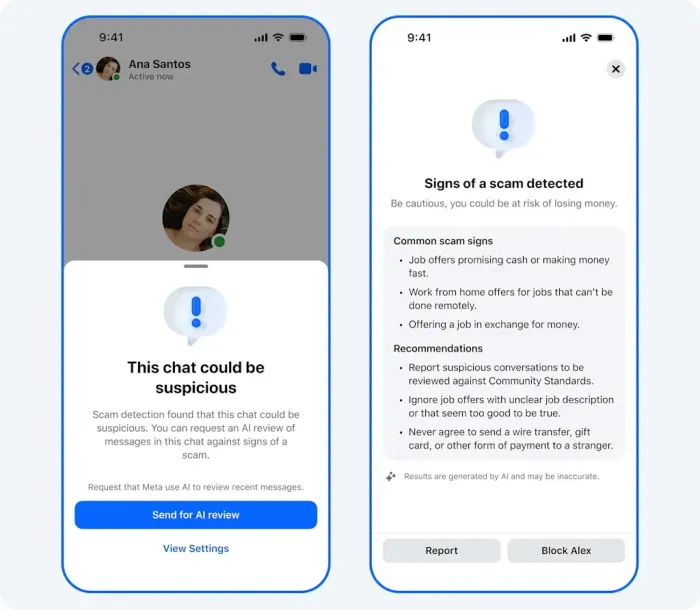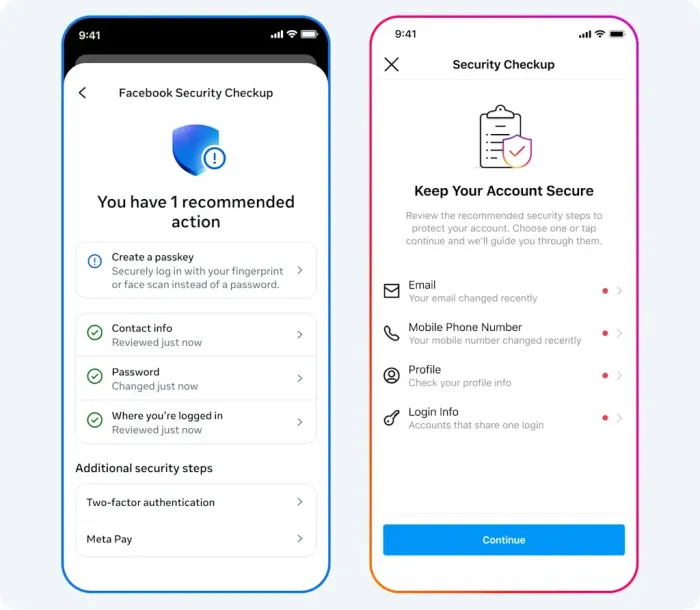
.
Image: Meta
Meta is working to make its apps better for boomers. This week the company announced new UX features designed to deter scammers and make Meta’s apps safer for older adults.
Scammers today use all kinds of tricks to part people from their money, like soliciting personal information under the guise of fake government benefits, brazenly pretending to be customer service support, and chatting up unwitting people in the comments section of a real business’s social media page to lure them to another page.

.
Image: Meta
Meta says its new in-app warnings are meant to combat that type of behavior, and will be triggered by suspicious activity.
On the chat app WhatsApp, users who attempt to share their screen with an unknown contact during a video call will get a warning that says “Only share your screen with people you trust.” The pop-up notes that sharing your screen lets those you share it with “see anything you display on your screen, including sensitive details like your banking info.”
On Messenger, Meta says it’s testing more advanced scam detection in chats. The company says that when scam detection is enabled, suspicious chats will trigger a warning that prompts users to request an AI review, which will explain why the message was flagged, plus provide tips for staying safe online. The feature can be toggled off or on by going to privacy and safety settings and tapping scam detection.

.
Image: Meta
An example AI review Meta shared of a flagged suspicious message notes “common scam signs” such as job offers promising fast cash or the ability to work from home for a job that can’t be done remotely. The AI review goes on to suggest the recipient of the message ignore job offers that seem too good to be true and never agree to send gift cards, a wire transfer, or other forms of payment to a stranger. That includes strangers who are famous.
Scammers have faked the likenesses of public figures such as Taylor Swift to make it appear as if the pop star is promoting a cookware set giveaway, and actors like Helen Mirren and Jamie Lee Curtis have in recent months warned fans about scammers using their likeness on Instagram.
Meta, which was hit this month with a class-action lawsuit that alleges it profits off of impersonation scam ads, announced it’s investing in cracking down on celebrity scams in the EU, U.K., and South Korea by using facial ID technology and AI.

.
Image: Meta
Online scams are a real problem for Meta and other companies. Meta says since the start of year, it’s disrupted nearly 8 million Facebook and Instagram accounts associated with criminal scam centres, and these and other scams have proven costly for victims.
According to the FBI’s Internet Crime Report, in 2024, people ages 60 and older lost a total of $4.8 billion to fraud—more than any other group. That’s up from more than $3 billion in 2023.
Best practice for designing digital products for an aging population often calls for features like bigger fonts and intuitive design, but it also means making it safe from scammers and fraudsters who target older individuals.
As Meta attempts to shore up online safety for young people by launching teen accounts with heightened parental controls, it’s clear the company also has work to do for its users at the other end of the age spectrum.
ABOUT THE AUTHOR
Hunter Schwarz is a Fast Company contributor who covers the intersection of design and advertising, branding, business, civics, fashion, fonts, packaging, politics, sports, and technology. Hunter is the author of Yello, a newsletter about political persuasion.
FAST COMPANY
